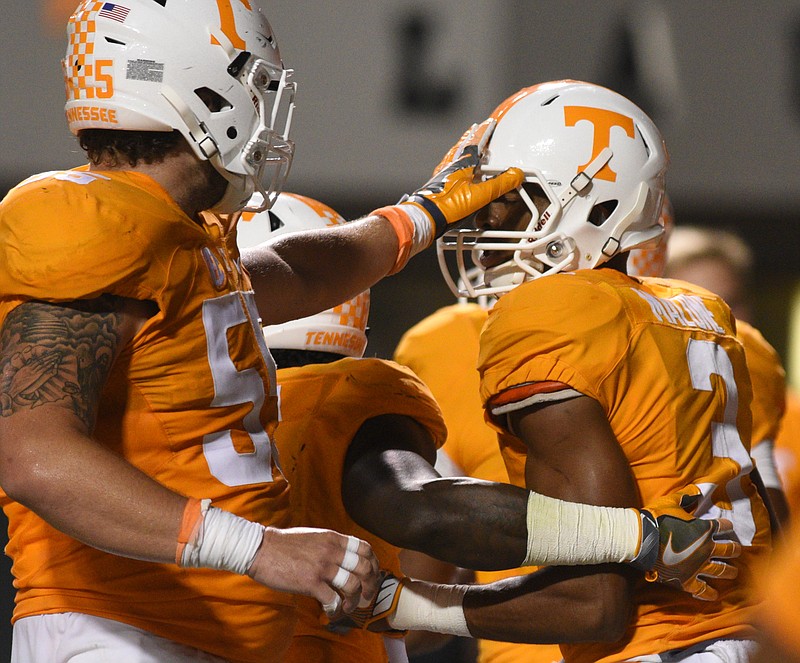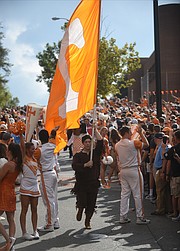KNOXVILLE - Perhaps because he's not just a senior, but an aerospace engineering major, Tennessee quarterback Josh Dobbs didn't take long to perfectly assess this Saturday night's "Battle at Bristol" game against Virginia Tech at the Bristol Motor Speedway.
"It will be exciting," Dobbs said after brushing aside rumors that he'd cracked five ribs as a result of being crushed at the goal line on the Vols' final offensive play of overtime against Appalachian State last Thursday night.
"There will be lots of people there setting (the NCAA football) attendance record. But if we're more focused on the environment than the opponent, we won't come out on top."
No one much considered that scenario as remotely possible this time last week. The first real test of this team's mettle and muscle was supposed to come Sept. 24, when Florida would bring its 11-game winning streak over the Vols to Neyland Stadium.
But then the Mountaineers marched into Neyland last week, jumped to a 13-3 lead and quite possibly came within a shanked extra point of knocking off the No. 9 team in the land.
"I believe we had seven missed tackles," said Tennessee coach Butch Jones, who was wearing a "Battle at Bristol" polo shirt. "But those missed tackles came at an inappropriate time."
At least one very large reason for those missed tackles may have been due to linebacker Jalen Reeves-Maybin's expulsion from the game due to his inappropriate tackle of ASU punt returner Jaquil Capel. Flagged for "targeting," JRM was suspended by the officials for the final three quarters.
But because the penalty took place in the first half, he'll be free to play the whole game against the Hokies, rather than being forced to sit the first half, which would have happened had the penalty taken place in the second half against Appalachian State.
"Kind of a weird play," Reeves-Maybin said during his turn at the microphone. And it was. Capel signaled for a fair catch almost as soon as the ball was punted, then went low to catch it as Reeves-Maybin arrived at the scene, having apparently missed Capel's fair-catch signal. When helmet hit helmet - even if some believed Reeves-Maybin was attempting to lead with the shoulder - his night was done.
To his credit, JRM didn't dispute the call so much as the perceived intent. He was also quick to add, "I won't do it next time."
But the gist of this play will have lots of next times, as it did over the weekend, especially in the Texas-Notre Dame overtime game Sunday night. In that one, what appeared to be an even more indisputable example of targeting wasn't flagged against a Texas defender, despite the fact that targeting can also be called from the replay booth upon review.
Unlike Capel, Notre Dame's Torii Hunter Jr. - son of the longtime major league baseball star - suffered a concussion, which caused the Irish's best receiver to leave the game, and that happened without 15 bonus yards for his team and the ejection of the Texas defensive back.
The Atlantic Coast Conference reportedly told Notre Dame coach Brian Kelly on Monday that targeting should have been called, but that won't change the outcome or the fact that officials need to err far more often on the side of the player who was targeted rather than the one who delivered the blow.
"It wasn't even reviewed, which just doesn't make any sense to me," Brian Kelly told numerous media outlets. "I've been in this game a long time, and I know when somebody gets hit in the head. He certainly was hit in the head on that play in the end zone."
It should be easy. If you're hit in the head in an aggressive, intentional matter, either with the opponent's helmet, shoulder pad or forearm, you need to be ejected. Is the game as exciting as a blood sport without those hits? Absolutely not. But that doesn't mean those cheap shots belong. The game can be played differently. Hits above the neck could be abolished quite easily. The long-term danger to the players would shrink dramatically.
Even the Vols' Jones noted Monday that he and his coaches teach their defensive players to keep their "eyes on the thighs."
Not the necks, wings or breasts. The thighs. Most of us of a certain age who played football in the 1950s, 1960s or early 1970s can relate. Coaches talked of targeting the waist, because the waist is centralized. But regardless of where you aim, only below the neck should be fair game.
That doesn't mean we won't continue to witness such collisions moving forward, perhaps as early as this weekend at Bristol Motor Speedway, which is used to violent crashes on its racing oval. What Jones expects to see above all is a more focused Tennessee team.
"We'll see every blitz known to man," he said of the Hokies, who topped Liberty 36-13 over the weekend. "And they're going to run 85 to 95 plays on offense. You can't have an inattention to details."
Regarding last week's offensive breakdowns, Coach Cliche added, "One wrong, all wrong," which has surely made its way to the top of all of the team's meeting-room dry eraser boards.
But given the narrow win over Appalachian State, the fans surely hope something else Jones said Monday resonates with those who eventually will pick the four teams lucky enough to reach the college football playoff.
"This is really kind of a first game here for us," he said of the matchup at Bristol.
Or at least the first chance to make people forget the real first game.
Contact Mark Wiedmer at mwiedmer@timesfreepress.com.

